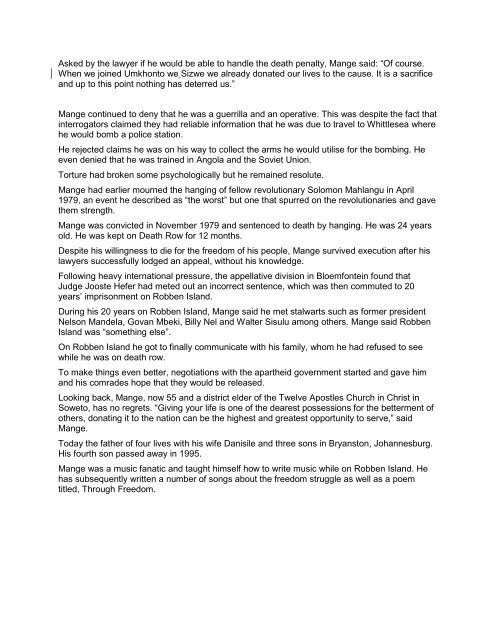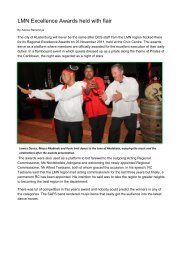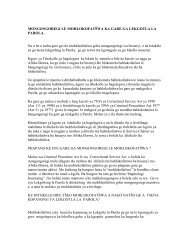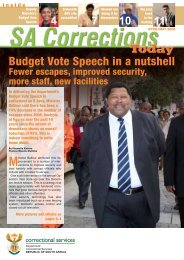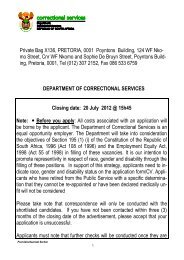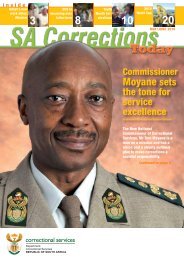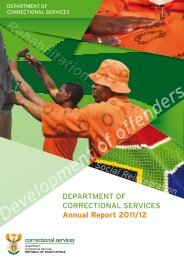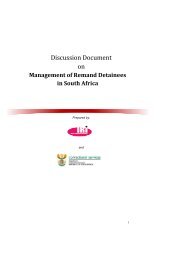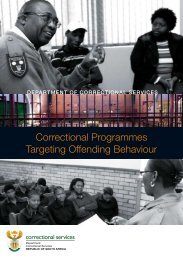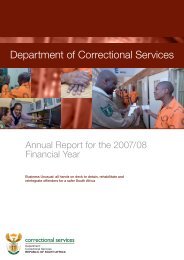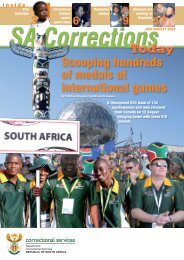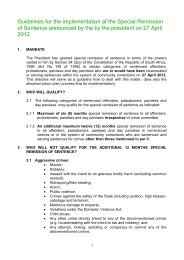Freedom fighter James Mange tells of torture, surviving death penalty
Freedom fighter James Mange tells of torture, surviving death penalty
Freedom fighter James Mange tells of torture, surviving death penalty
You also want an ePaper? Increase the reach of your titles
YUMPU automatically turns print PDFs into web optimized ePapers that Google loves.
Asked by the lawyer if he would be able to handle the <strong>death</strong> <strong>penalty</strong>, <strong>Mange</strong> said: “Of course.<br />
When we joined Umkhonto we Sizwe we already donated our lives to the cause. It is a sacrifice<br />
and up to this point nothing has deterred us.”<br />
<strong>Mange</strong> continued to deny that he was a guerrilla and an operative. This was despite the fact that<br />
interrogators claimed they had reliable information that he was due to travel to Whittlesea where<br />
he would bomb a police station.<br />
He rejected claims he was on his way to collect the arms he would utilise for the bombing. He<br />
even denied that he was trained in Angola and the Soviet Union.<br />
Torture had broken some psychologically but he remained resolute.<br />
<strong>Mange</strong> had earlier mourned the hanging <strong>of</strong> fellow revolutionary Solomon Mahlangu in April<br />
1979, an event he described as “the worst” but one that spurred on the revolutionaries and gave<br />
them strength.<br />
<strong>Mange</strong> was convicted in November 1979 and sentenced to <strong>death</strong> by hanging. He was 24 years<br />
old. He was kept on Death Row for 12 months.<br />
Despite his willingness to die for the freedom <strong>of</strong> his people, <strong>Mange</strong> survived execution after his<br />
lawyers successfully lodged an appeal, without his knowledge.<br />
Following heavy international pressure, the appellative division in Bloemfontein found that<br />
Judge Jooste Hefer had meted out an incorrect sentence, which was then commuted to 20<br />
years’ imprisonment on Robben Island.<br />
During his 20 years on Robben Island, <strong>Mange</strong> said he met stalwarts such as former president<br />
Nelson Mandela, Govan Mbeki, Billy Nel and Walter Sisulu among others. <strong>Mange</strong> said Robben<br />
Island was “something else”.<br />
On Robben Island he got to finally communicate with his family, whom he had refused to see<br />
while he was on <strong>death</strong> row.<br />
To make things even better, negotiations with the apartheid government started and gave him<br />
and his comrades hope that they would be released.<br />
Looking back, <strong>Mange</strong>, now 55 and a district elder <strong>of</strong> the Twelve Apostles Church in Christ in<br />
Soweto, has no regrets. “Giving your life is one <strong>of</strong> the dearest possessions for the betterment <strong>of</strong><br />
others, donating it to the nation can be the highest and greatest opportunity to serve,” said<br />
<strong>Mange</strong>.<br />
Today the father <strong>of</strong> four lives with his wife Danisile and three sons in Bryanston, Johannesburg.<br />
His fourth son passed away in 1995.<br />
<strong>Mange</strong> was a music fanatic and taught himself how to write music while on Robben Island. He<br />
has subsequently written a number <strong>of</strong> songs about the freedom struggle as well as a poem<br />
titled, Through <strong>Freedom</strong>.


